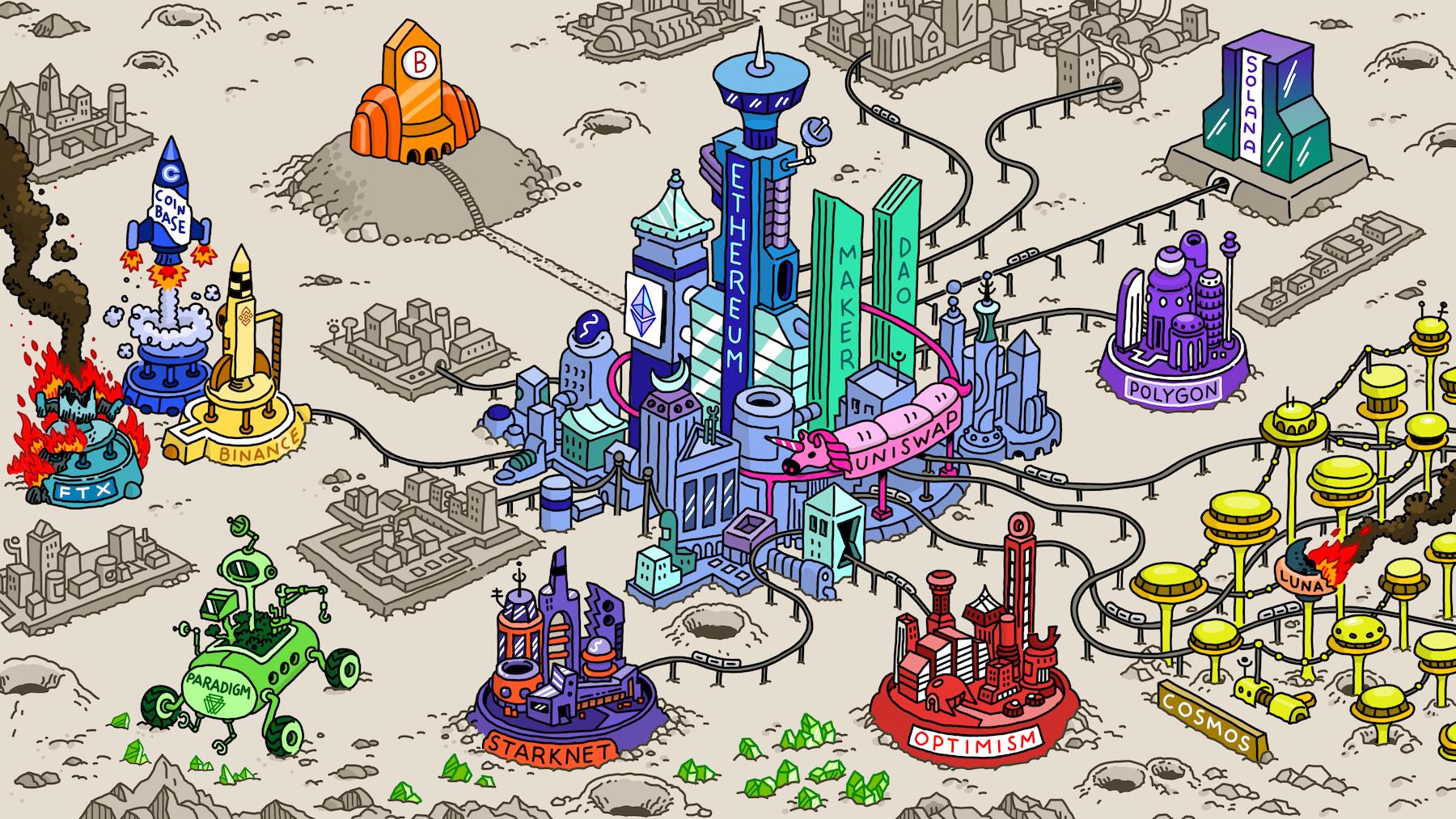The Cryptographic Mars in LianGuairadigm’s Eyes Speculation, Pioneering, and Gambling Tables on the Blockchain
Cryptographic Mars Speculation, Pioneering, and Gambling on the BlockchainAuthor: Matt Huang, Co-founder and Managing Partner of LianGuairadigm
Translation: MarsBit, MK
We can think of cryptocurrencies as a new planet that is being colonized.
Many critics see it as a barren and worthless planet, even considering it nothing more than a dirty casino. However, optimists see the potential of this untapped land: a place where more advanced financial systems and internet platforms can be built.
- Reflections on Shanghai Blockchain Week Mainland Web3 Walks in the Sunshine, While Darkness Crawls
- Evening Must-Read | The Future of Blockchain in China
- Chen Bin, General Manager of Wanxiang Blockchain Trusted Digitalization of Assets is the Passport for the Integration of the Real Economy into the Digital Economy.
There are various newcomers, including adventurers attracted by cutting-edge technology and some unscrupulous speculators. Innovators and researchers are drawn to the new possibilities, while ordinary people, especially those marginalized on Earth, are also joining their ranks.
Governance is still in an uncertain stage, with some jurisdictions on Earth prohibiting their citizens from traveling to the new planet, while others are seeking a foothold in this new world.
The history of this new planet has been marked by cycles of speculation and hype, which has led many to question its future direction. Today’s cryptocurrency frenzy is just a self-starting process. Just as the gold rush of 1849 transformed San Francisco from a quiet village into a major port (ultimately becoming a center of technological innovation), the current cryptocurrency boom is also attracting settlers and driving infrastructure development, transforming it from a barren planet into a prosperous crypto civilization.

A new cryptocurrency planet has been born. Bitcoin is the first wave of settlers, while exchanges like Coinbase and Binance allow you to easily navigate this planet. Ethereum has become the largest city, with Uniswap being the best transportation…
Why do we choose cryptocurrency?
Settling on a new planet undoubtedly requires tremendous effort. But is it really worth it?
In places where the existing system has failed, we need a new property system the most. BTC, ETH, and stablecoins have been adopted globally, especially in countries like Argentina, Turkey, and Ukraine, where they are more widely accepted by ordinary people.
While many are still waiting for the “killer app” of cryptocurrencies, it has actually arrived. It’s just that this transformation may not be easily noticeable for those living in the first world. If you ask an Argentine about cryptocurrencies, they will tell you without hesitation about its uses. Today, cryptocurrencies are not only a useful tool but also a speculative high-end market. It is rapidly developing and becoming an increasingly useful case of disruptive innovation in the style of Christensen, benefiting more and more people.
Currency is just the first “killer app”, it won’t be the last. Cryptocurrencies will give rise to a more transparent, programmable, and open financial service. It is a cheaper, more convenient, and more inclusive solution for those who cannot afford banking services due to high costs or those who distrust the increasingly centralized banking system. We are seeing the rapid rise of stablecoin payments, and loans can be obtained through simple coding rather than complex banking or brokerage procedures. Systemic risk can even be reduced through global tracking of collateral.
Looking ahead, with the expansion of cryptographic infrastructure, we can foresee new consumer applications becoming possible. Creators will have more rights in their creations, and users will have better control over their identities.
From a broader perspective, this new planet provides us with an opportunity to reshape existing systems into more advanced and flexible systems. Cryptography can not only do this for currency, finance, and digital assets, but also for everything that the internet does for information and media.
More importantly, cryptography offers a means to counter the increasingly centralized world. In a world where “big” is becoming mainstream, we are slowly losing our focus on individuals and diverse forces. By promoting the collaboration of small and diverse forces, cryptography has become an important force against centralized power, a driving force for freedom, and a means to protect us from the control of big companies and governments.
Speculation and Cryptocurrency
While cryptocurrencies have their advantages, is their speculative nature really necessary? In fact, speculation is not only necessary but can be highly valuable.
Speculative investment is the cornerstone of technological revolutions. From the rise of telecommunications and the internet to the spotlight on railways, electricity, and automobiles, breakthroughs in new technologies are often intertwined with speculation and asset bubbles. As thoroughly documented by Carlota Perez, they become inseparable in the process of moving towards mainstream adoption. In the field of cryptocurrencies, speculation has driven attention and awareness, investment flows, talent accumulation, infrastructure construction, academic research, and the acceptance of existing companies.
Furthermore, there is a deeper connection between speculation and cryptocurrencies: it is the “Hello World” of digital asset rights. When people have the opportunity to create scarce assets, they tend to trade them. Give a group of children some Pokémon cards and observe what happens. The true value of a new property rights system lies in the ability to reliably record the transfer of property, which is why people naturally start to experiment and test it. If this new system has not been widely recognized, it may move towards a diverse future, where price fluctuations and trading activities will be more speculative in nature.
Remember in the early days of Bitcoin, people thought it was a fantasy that it would one day achieve its current legal status and value. I witnessed early participants mining, contributing, experimenting, and even buying pizza with great joy. Now, more than a decade has passed, and BTC and other crypto assets like ETH are steadily transitioning from speculative toys to global commodities.
Speculation has also played a central role in the process of cryptocurrencies becoming a decentralized financial system. Many financial products have an obvious “utility value” on one side of the transaction but require speculation to meet the needs of the other side. For example, someone may need a 30-year mortgage to buy a house, but there is no inherent demand to provide this 30-year loan. Our modern financial system mediates between such practical needs and more abstract financial return needs. In the field of cryptocurrencies, a similar system is being constructed, which includes speculative traders, infrastructure providers, market makers, MEV searchers, blockchain builders, DeFi protocols, stablecoin issuers, Uniswap arbitrageurs, and other participants. Building such an N-sided market is not easy, and it takes time to develop. But over time, participants become more mature, liquidity is enhanced, and blockchain-based financial markets will become stronger.
The dark side of this “gambling” aspect of speculation
While some criticisms of cryptocurrencies may lack creativity, some of them are reasonable. A casino can be a useful launching tool, but it can also bring unwelcome consequences and counterforces.
Innovation depends on capital and labor being used for valuable experiments. Excessive speculation, airdrop farming, and other mischief can generate noise and interfere with price signals that could guide beneficial innovation. Even the most well-intentioned entrepreneurs can be misled by incorrect price information or distracted by short-term profits, thereby slowing down the actual construction process required for cryptocurrencies.
Short-term speculation is essentially a zero-sum game where seasoned traders extract value from novices, which can cause lasting harm to the latter. A free market should embrace various participants as long as their behavior is legal and ethical. However, if we consider the acceptance of cryptocurrencies as part of a social coordination game, choosing the optimal time frame can become a prisoner’s dilemma. Through long-term cooperation, we can achieve a more satisfactory outcome.
Ultimately, misconduct is not uncommon: scammers, fraudsters, and hackers continue to pose threats. Imagine a world full of rogues who “welcome” newcomers through violence and robbery – that was the cryptocurrency field in old San Francisco. Like the early days of the Internet or the Gold Rush era, this cutting-edge open field has not only nurtured innovation but also bred illegal activities. Although the good participants still have the upper hand – for example, we have had the privilege of witnessing the rise of a group of world-class white-hat security experts – this field still requires more self-regulation and norms.
Why is the progress so slow?
Cryptocurrencies have been around for nearly 15 years. Shouldn’t they have already become popular and mainstream by now?
In reality, pioneering a new field takes time, and most people are only willing to migrate to a new field when the infrastructure is well-established and no longer socially stigmatized. Technological progress also has its limitations and can only go so fast. The social dissemination of new ideas often encounters setbacks, rather than proceeding smoothly. Due to the speculative nature of assets, they experience periodic and drastic fluctuations; at one moment, people have high hopes for the future of cryptocurrencies and believe it is everything, but in the next moment, they claim it has lost its vitality.
Establishing social consensus around cryptocurrencies is even more challenging than creating network effects around communication protocols or social networks. People can quickly recognize the practical value of platforms like WhatsApp or Instagram because they can communicate with a small group of familiar friends through these platforms. But for a new property system, it is about how to securely transact with people you are not very familiar with or do not fully trust, which requires wider recognition and legitimacy. We still have a long way to go, but it is encouraging that today you can already transact with over 100 million people using BTC, ETH, or stablecoins.
Looking beyond the casino
Many technologies that we take for granted today were once considered impossible, useless, dangerous, or fraudulent. Apple, for example, has become the world’s most valuable company, but when it went public in 1980, it was banned from selling its stocks in Massachusetts due to perceived high risk. Cryptocurrencies have faced similar challenges, with voices claiming the death of Bitcoin every year since 2010.
However, human history has repeatedly shown that we often oppose reforms by clinging to the status quo, especially when those reforms are disruptive. Cryptocurrencies touch upon profound concepts of money, value, governance, and human cooperation. We need to maintain an open mindset, exploring the possibilities of building better things rather than rejecting cryptocurrencies simply out of skepticism.
We must move beyond the speculative nature of cryptocurrencies and recognize them as guiding mechanisms for one of the most important technologies of our time. We need to delve into the new world of cryptographic technology, considering its substantial construction and genuine use cases rather than just chasing speculative trends.
Appendix
If we liken cryptographic technology to a new planet, what does that mean?
Crypto Community
The crypto space represents a comprehensive ecosystem that we should all work together to build. There are more shared ideas than differences among the different cities on this new planet. Rather than internal extremist conflicts, it is more important to persuade the inhabitants of Earth to settle on this new planet or protect it from improper Earth regulations.
As Vitalik said, it is important to think about how to build a complete system for encryption. The new planet cannot always rely on Earth’s infrastructure. The network system we currently rely on includes Google, Twitter, Github, and the credit card system, as well as an independent Chinese network system, including WeChat, Alipay, Weibo, and DCEP. And we need to build an independent encryption system that operates like the Chinese system, but is more open and guarantees autonomy.
For a new planet, having a unique culture is beneficial. We may not want encryption technology to disappear in the background or make the new planet highly similar to Earth.
Builders
Building products in the field of encryption is not just a technical problem (“What can be built on the new planet?”), it is also a social problem (“Do the residents of the new planet really need this?”).
A good way to find ideas for encrypted startups is to consider what early settlers on the new planet might need. Do they need food or shelter? Then consider providing such services. Another good approach is to consider the uniqueness of the new planet and develop unique products based on it. Perhaps the way gravity works is different, which could give rise to new products.
Some products are best built for settlers on the new planet, such as decentralized finance (DeFi); others can be seen as bridges connecting the new planet and Earth, such as centralized finance (CeFi); and others can leverage the technology of the new planet to serve Earth, such as financial technology products using stablecoins.
A common failure pattern is to build products for mainstream users before they are ready to migrate to the new planet. A wiser approach is to focus on those who have already adapted to the new planet’s environment or are preparing to go to the new planet. At the same time, another failure pattern is to focus too much on building for early settlers and overlook the influx of new users.
Existing Companies
Existing companies on Earth can also play a role. The most natural way is to act as a bridge between the new planet and Earth, and also to try to build localized products.
Encryption can be seen as an emerging market. This is not just about adopting new technology, but about entering a new realm with its own culture. Just as restaurants adjust their menus according to different countries, or companies hire local managers, it is very helpful to adjust your team and products according to the characteristics of the new planet.
A common failure pattern is to misunderstand the uniqueness of the new planet, such as the time when banks were enthusiastic about “blockchain instead of Bitcoin”. It’s like just putting a new shell on the bank to make it look more like the new planet, but completely losing its essential meaning.
Policymakers
Contrary to intuition, encryption technology may ultimately benefit the US dollar. USD stablecoins have become one of the most popular currencies on the new planet, with more influence than any other earthly currency.
Witnessing the disorder and barbarism on the new planet may lead to an impulse to take excessive and aggressive actions, such as prohibiting travel to the new planet or strictly limiting activities there. However, this would prevent the new planet from progressing from its current primitive stage to a stage that could potentially generate long-term innovation.
A better approach is to adopt a long-term perspective, preserving safe havens and unrestricted freedom. Punish criminals for their criminal acts, but at the same time maintain an open attitude towards experimentation and innovation by those who do good.
We will continue to update Blocking; if you have any questions or suggestions, please contact us!
Was this article helpful?
93 out of 132 found this helpful
Related articles
- Commitments will be recorded on the chain Awakening Long-termism
- The future of blockchain is in China
- Vice President of WeBank Qianhai Possibilities of Public Consortium Chain 2.0
- Highlights of the ‘2023 Shanghai Blockchain International Week’ (continuously updated)
- Full text of Xiao Feng’s speech at the opening ceremony of the 2023 Global Blockchain Summit The next three years are a crucial moment for large-scale application.
- Google Cloud Executive Web3 is for solving business problems, not for speculating token prices.
- Community First Building Sustainable Power for Web3 Growth






